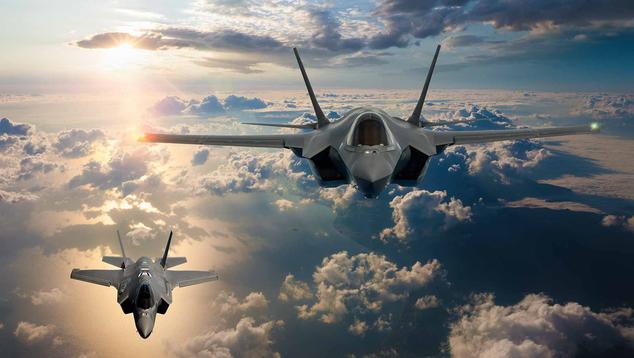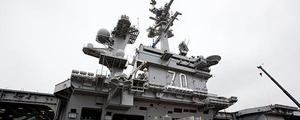The U.S. is not directly involved in the current war in Ukraine, but the conflict has, inevitably, increased the focus on America's military. Investors have zeroed in on military and defense stocks, running up their values in anticipation of increased defense spending, both here and in allied countries.
The U.S. government's military spending in the next fiscal year is almost certainly going to rise significantly, according to news reports, underscoring why investors are interested in defense-related stocks. As Forbes analyst Sergei Klebnikov recently summarized, "Shares of major U.S. aerospace and defense companies, which have jumped since Russia launched its invasion of Ukraine last week, should continue to surge higher as global defense spending budgets increase in response to the conflict in Eastern Europe, analysts predict." Another investing site recently cut straight to the financial chase, headlining its report, "10 Defense Stocks to Buy as Geopolitical Tensions Rise."
We know that public opinion can have a significant, albeit largely indirect, impact on the stock market and corporate governance -- mainly through consumer purchasing decisions and influence on government policymaking. The consumer angle isn't a factor in this situation. But government policy does (and should) reflect public opinion, and that opinion at this point is generally positive. The public has confidence in the military and believes it is doing a good job, and a significant majority of Americans also believe it is important that the U.S. maintain the best military in the world. But Americans' views on increased defense spending are mixed when they are asked about it directly.
U.S. Public Opinion Supportive of the Military
I reviewed the public's views about the military in 2019, and although there have been some changes evident in Gallup updates in the two-plus years since, the basic pattern of public opinion remains the same. The military essentially ties with small business as the institutions (out of 16 tested) in which the public has the most confidence. Although perceptions of the honesty and ethics of military officers fell in our latest December update, they place fifth in the list of 22 professions tested on this dimension, only slightly behind pharmacists and grade-school teachers. Data from January also show that satisfaction with the state of the nation's military strength and preparedness was tied with two other aspects of U.S. life at the top of a list of 21 policy areas tested.
We also have relevant data from our Feb. 1-17 World Affairs poll. This survey was completed before the Feb. 24 Russian invasion of Ukraine, but the buildup to the invasion was very much in the news at the time of the poll. Gallup's Justin McCarthy recently reported on two trend questions relating to U.S. military strength from that poll. One asked the public how important it is for the U.S. to be No. 1 in the world militarily. Another asked if the U.S. is, in fact, currently No. 1 militarily. The data show that the significant majority of Americans (68%) believe it is important that the U.S. be No. 1 around the world militarily, but that just over half (51%) believe this is the case currently.
These two questions are significant. The finding that two-thirds of Americans say it is important for the U.S. to be No. 1 militarily certainly implies strong underlying support for a robust military.
Americans' Attitudes Are More Mixed on Defense Spending
But as noted, when Americans are asked directly about government spending for national defense and military purposes, we have consistently found mixed results. Gallup's question, asked off and on since 1969 and every year since 2000, gives respondents three options: spending too little on the military, spending about the right amount or spending too much. Responses over the years have generally been divided across the three response categories, exemplified by Gallup's February 2022 poll showing that Americans are essentially split into thirds: 32% say there is too little military spending and 31% too much, with 34% saying spending is about right. The only time the "too little" percentage reached the majority level was in January 1981, just as Ronald Reagan was ascending to the presidency after having defeated incumbent Jimmy Carter on a platform arguing that the U.S. military had become dangerously weak.
As is often the case with three-part survey questions, there are several ways in which the results can be interpreted. From one perspective, there isn't now and hasn't been in recent years a clamoring for increased defense spending: A majority of Americans say either that such spending is about right or too much. On the other hand, there isn't a clamoring for reduced spending either: A majority of Americans say either that such spending is about right or too little.
I noted in the 2019 review that the challenge for the president and Pentagon leaders is "to explain why the excellent job the military is doing today (as perceived by the public) translates into the need for more and more military funding tomorrow." The situation in Ukraine may be providing the catalyst and environment propitious for just this type of persuasion.
Is Investing in Military and Defense Stocks Socially Responsible?
The situation in Ukraine has raised issues about the ethics of investing in war-related industries. Just as investing in war bonds became a patriotic duty in World War II, is it possible that the Russian invasion of Ukraine will provide a patriotic rationale for investing in defense and military stocks?
Socially responsible, ESG (Environment, Social, Governance) investing has typically had little connection with military and defense stocks. As a Barron's review put it, "Most firms in the aerospace and defense industry have part of their business in the manufacturing of military weapons, which is identified as a negative category in most ESG frameworks." But the urgency of the current situation in which Russia is militarily invading Ukraine has reemphasized the importance of the military for sustaining a world free from tyranny and for maintaining nations' sovereignty. This could in theory change the prevailing perspective on what is and is not socially responsible.
A recent New York Times article -- "Russia's War Prompts a Pitch for 'Socially Responsible' Military Stocks" -- highlighted conflicting viewpoints in this regard. Some analysts, the article pointed out, are now arguing that investments in military and defense-related stocks can be considered part of an ESG investing program, given the importance of defense and deterrence to the future of the nation. In short, avoiding war and international conflict is in many ways at the base of any sustainability effort. Others argue strongly that defense stocks have not been and should continue not to be considered socially responsible.
The argument about which stocks do and do not qualify within an ESG framework operates in a fairly limited investment space and can quickly become arcane. Most Americans are likely unfamiliar with the concepts involved. Gallup estimates that adults in only two in five American households are investors (with at least $10,000 in investments), and Gallup polling conducted last November shows that a full three-quarters of these investors in turn have heard only a little (31%) or nothing (44%) about "Environmental, Social and Governance" (ESG) investing, "responsible investing" and "social impact investing."
Gallup's polls of investors have not directly asked investors whether investing in military and defense stocks is ethical, moral or responsible. I'm not aware of any other surveys that have done so either.
But as we have seen, the American public's strong current of positivity about the military might provide support for arguments that investment in defense and military companies is morally and socially responsible and, in fact, necessary for social sustainability. The data reviewed above showing that more than two-thirds of the public thinks it is important for the U.S. to be No. 1 militarily in particular would seem to support the idea that investing in military stocks is in the national interest, not inimical to it.
All in all, those who might push for the designation of defense firms as meeting ESG requirements don't get a lot of direct guidance from available measures of public opinion. But we can say, at this juncture, that there would not appear to be strong public pressure for equity funds to avoid investments in defense and military stocks, and presumably not much pushback, if ESG funds were to include defense investments in the future.




